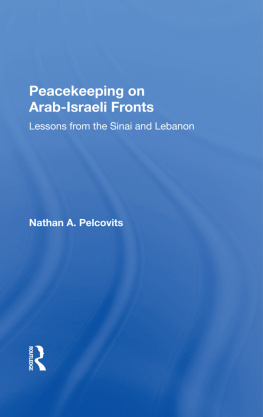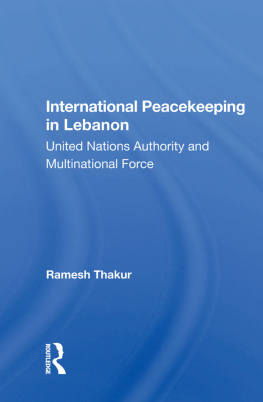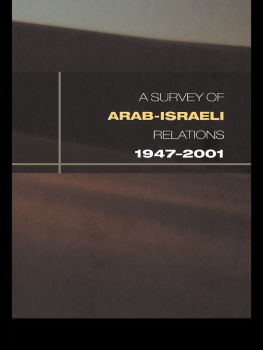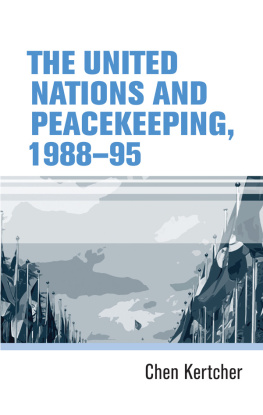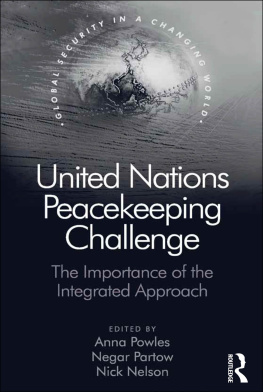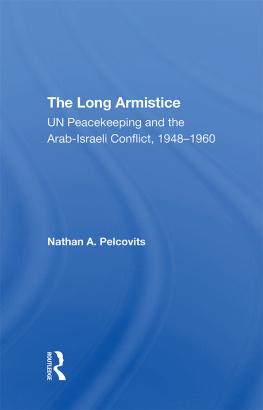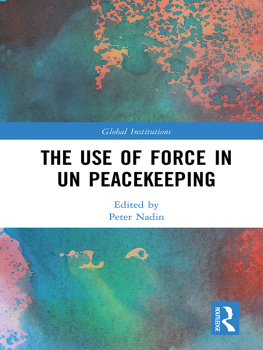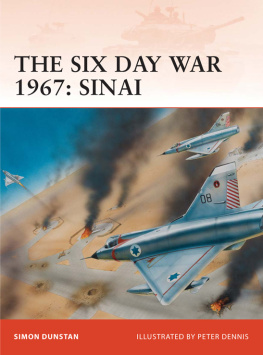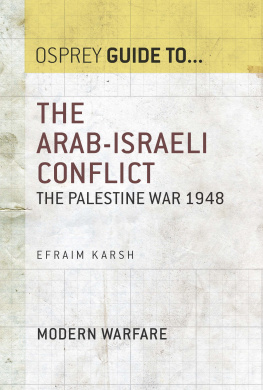SAIS PAPERS IN INTERNATIONAL AFFAIRS
Peacekeeping on Arab-Israeli Fronts
Westview Press / Foreign Policy Institute School of Advanced International Studies the Johns Hopkins University
First published 1984 by Westview Press
Published 2019 by Routledge
52 Vanderbilt Avenue, New York, NY 10017
2 Park Square, Milton Park, Abingdon, Oxon OX14 4RN
Routledge is an imprint of the Taylor & Francis Group, an informa business
Copyright 1984 by The Johns Hopkins Foreign Policy Institute, School of Advanced International Studies
All rights reserved. No part of this publication may be reproduced or transmitted in any form or by any means, electronic or mechanical, including photocopy, recording, or any information storage and retrieval system, without permission in writing from the publisher.
Notice:
Product or corporate names may be trademarks or registered trademarks, and are used only for identification and explanation without intent to infringe.
Library of Congress Catalog Card Number: 84-51609
ISBN 13: 978-0-367-28252-3 (hbk)
THE JOHNS HOPKINS FOREIGN POLICY INSTITUTE
Lucius D. Battle
Chairman
Philip Geyelin
Editor-in-Residence
Archie Albright
Executive-in-Residence
Harold Brown
Distinguished Visiting Professor National Security Affairs
Murray Gart
Research Associate
Kristen E. Carpenter
Managing Editor Publications Program
Janet Smith
Assistant to the Chairman
Robert E. Osgood
Director of Research Codirector, Security Studies Program (on leave)
Michael Vlahos
CodirectorSecurity Studies Program
Wilfrid Kohl
Director International Energy Program
Christian A. Herter, Jr.
Fellow
Celeste R. Wilson
Programs Coordinator
George R. Packard
Dean, School of Advanced International Studies, The Johns Hopkins University
The Johns Hopkins Foreign Policy Institute (FPI) was founded in 1980 and serves as the research center for the School of Advanced International Studies (SAIS) in Washington, D.C. The FPI is a meeting place for SAIS faculty members and students, as well as for government analysts, policymakers, diplomats, journalists, business leaders, and other specialists in international affairs. In addition to conducting research on various policy-related international issues, the FPI sponsors conferences, seminars, and roundtables.
The FPPs research activities are often carried on in conjunction with SAISs regional and functional programs dealing with American foreign policy, Latin America and the Caribbean Basin, Africa, the Middle East, the Soviet Union, U.S.-Japan relations, Canada, security studies, international energy, the Far East, Europe, and international economics.
FPI publications include the SAIS Review, a biannual journal of foreign affairs, which is edited by SAIS students, and SAIS Papers in International Affairs, a monograph series which is copublished with Westview Press in Boulder, Colorado. For additional information regarding FPI publications, write to: Managing Editor, FPI Publications Program, School of Advanced International Studies, The Johns Hopkins University, 1740 Massachusetts Avenue, N.W. Washington, D.C. 20036.
To the memory of Leamon Ray Hunt
About the Book and Author
Since 1948, the United Nations has sponsored virtually every third-party peacekeeping mission on Arab-Israeli fronts. Three recent events, however, have been responsible for significantly altering the pattern of peacekeeping in the region: the Camp David accords, which, because they were opposed in the U.N. by the Soviet Union and most Arab nations, prevented U.N. sponsorship of a Sinai peace-keeping force; the June 1982 Israeli invasion of Lebanon, during which the U.N. Interim Force was made to look ineffectual; and the Sabra-Shatila massacres in South Beirut three months later, which prompted the deployment of a multinational peacekeeping force. Dr. Pelcovits analyzes these events to answer the questions they raise about peacekeeping in the Middle East: What advantages are afforded by U.N. peacekeepers compared with non-U.N. missions? What net benefits are derived from American participation in a non-U.N. multinational operation? And how do they compare to the classic U.N. peacekeeping rationale of insulating disputed areas from super-power confrontation? Finally, what determines the success of such operationsgeopolitical circumstance or institutional affiliation?
Nathan A. Pelcovits is a professorial lecturer at the School of Advanced International Studies, The Johns Hopkins University. He is the author of Security Guarantees in a Middle East Settlement (1976).
| IDF | Israeli Defense Forces |
| MFO | Sinai Multinational Force & Observers |
| MNF | Multinational Force in Beirut |
| OGL | Observer Group Lebanon |
| OPs | Observation Posts |
| PLO | Palestine Liberation Organization |
| RDF | Rapid Deployment Force |
| SSM | U.S. Sinai Support Mission |
| UNDOF | United Nations Disengagement Observer Force |
| UNEF | United Nations Emergency Force |
| UNFICYP | United Nations Force in Cyprus |
| UNIFIL | United Nations Interim Force in Lebanon |
| UNMOs | United Nations Military Observers |
| UNOC | United Nations Operation in the Congo |
| UNTAG | United Nations Transitional Assistance Group |
| UNTSO | United Nations Truce Supervisory Organization |
T HE VIRTUAL DISINTEGRATION OF THE Multinational Force (MNF) in Beirut early in 1984, and the move to replace it with a U.N. peacekeeping presence, occurred several weeks after the final draft of this paper was completed. This has not altered, however, the main lines of the analysis. That the MNF would have a short half-life as peacekeeper was predictable, as it had compromised the essentials for effective peacekeepingimpartiality among all warring factions, a political consensus embracing all nations with important interests in the outcome of the conflict, a clear goal, and a coherent structure able to sustain the cooperation of all troop-contributors.
As this study demonstrates, the MNF experience can be understood only in the broader context and complex history of a series of successful and not-so-successful efforts to enlist third-party peacekeepers in the protracted Arab-Israeli conflict. International peacekeepingthat is, the use of military observers or troops from third countries to monitor truce lines or disengagement arrangementshas experienced its most varied and challenging tests on Arab-Israeli fronts. Third-party involvement in stabilizing the region has been a constant feature there since the 1948 war. Following each of five or six wars, some form of U.N. presence has been installed either to supervise truce lines or to monitor and verify security arrangements (demilitarized and limited-forces zones) mandated in disengagement agreements.
But the pattern has changed in important ways in the last few years, and what has happened is instructive not only for peacekeeping possibilities in the Middle East but for an understanding of the utility of peacekeeping elsewhere. Up until two years ago, peacekeeping missions on Arab-Israeli frontsand in other regions for that matterwere mandated and managed by the United Nations. There was no practical alternative. In 1982 the picture and the options changed. In that year three events transformed the terms in which scholars and policymakers must henceforth think about the utilities of and options for enlisting peacekeepers in the Arab-Israeli conflict. These three events induced me to undertake the study.

